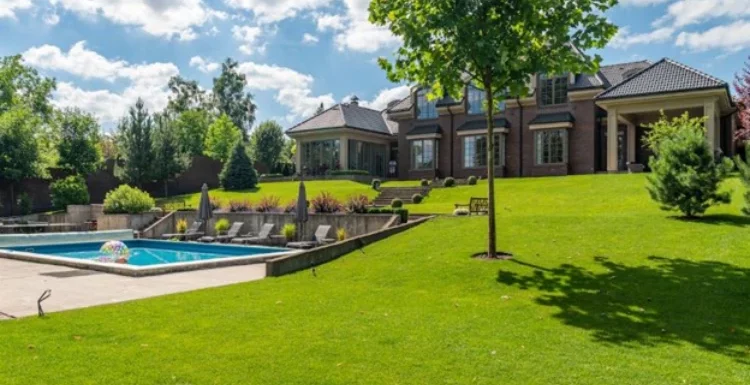
The art of lawn care is a natural extension of home decor, where a meticulously tended garden or yard can significantly enhance a home’s overall beauty and functionality. In the world of residential aesthetics, it’s widely acknowledged that a home’s allure isn’t confined to its interior walls; it breathes and lives in the gardens and yards that frame it. These outdoor spaces serve as a canvas for homeowners to express their tastes, preferences, and lifestyle, just as a well-designed living room or kitchen does.
In this article, we embark on a journey into the realm of lawn care, focusing on the intriguing choice that homeowners often face: Bermuda grass or St. Augustine? The decision between these two prominent turfgrass varieties can significantly impact the look and and feel of your outdoor space. By the end of this exploration, you will be armed with valuable insights to make an informed choice that not only enhances your lawn’s beauty but also aligns with your lifestyle and maintenance preferences.
The Allure of Bermuda Grass
Bermuda grass, renowned for its resilience and hardiness, has captured the hearts of lawn enthusiasts worldwide. Its global popularity can be attributed, in part, to the presence of two distinct varieties within the Bermuda grass family, Bimini Bermuda grass and Imperial Bermuda grass. These two varieties each bring their unique characteristics and advantages to the table, further enhancing Bermuda grass’s appeal.
- Origins and Global Spread: Originating from Africa, Bermuda grass has found a welcoming home in numerous sunny regions across the world. Bimini and Imperial Bermuda grass have followed suit, adapting to various climates and becoming popular choices for lawns.
- Visual Appeal: This grass showcases a fine-to-medium texture, creating a vibrant green landscape during its peak growth seasons. However, it’s important to note that Bermuda grass can enter a dormant, brownish phase in colder weather.
- Maintenance Advantages: Bermuda grass is known for its sun-loving nature. Once established, it displays impressive drought resistance and can withstand frequent foot traffic.
- Cost-Effective: When it comes to cost, Bermuda grass sod, including Bimini and Imperial varieties, is generally a more budget-friendly choice compared to its St. Augustine counterpart.
- A Consideration to Keep in Mind: For meticulous gardeners, it’s worth noting that Bermuda grass, including Bimini and Imperial varieties, may have a tendency to encroach on areas where it wasn’t originally intended, such as flowerbeds. Despite this, their overall appeal and adaptability continue to draw enthusiasts worldwide.
The Charm of St. Augustine Grass
St. Augustine, akin to the comforting shade provided by a grand old tree, exudes a deep, rich, and captivating allure. As we explore the unique qualities of St. Augustine grass in this comparison with Bermuda Grass, it’s important to understand the distinctive characteristics that make it a cherished choice for many lawn enthusiasts.
- Origins and Spread: With roots in the warm coastal meadows around the Gulf of Mexico and Mediterranean, St. Augustine feels right at home in balmy climates.
- Visual Appeal: This grass type steals the show with its broad leaves and deep green hue. Even when the temperature dips slightly, St. Augustine holds onto its vibrant color.
- Maintenance Dynamics: Unlike its Bermuda counterpart, St. Augustine appreciates a break from the sun now and then. However, be cautious—it’s not as forgiving to bustling foot traffic.
- Costing: Acquiring and maintaining a St. Augustine lawn may come with a slightly higher price tag. Nevertheless, many believe that its exceptional beauty justifies the investment in the long run.
- Something to Consider: Keep a vigilant eye out for the mischievous chinch bug, a pest known to have a penchant for St. Augustine lawns. This adds an extra layer of consideration for those who opt for this exquisite grass variety.
Decision Time: Bermuda or St. Augustine?
When the day arrives to make a choice, keep these key factors front and center:
- Climate Compatibility: Both grasses court the warmth, but St. Augustine can still flaunt its green even when it’s a tad chilly.
- Purpose and Traffic: Is your yard a playground for kids and pets? Bermuda might be the better contender. For a more tranquil, visual appeal, St. Augustine stands tall.
- Aesthetic Preferences: At the end of the day, it’s your lawn. Which texture, hue, and vibe resonates more with you?
Conclusion
The decision between Bermuda and St. Augustine is personal. Some homeowners might find the robust resilience of bermuda sod appealing, while others might be swayed by the aesthetic charm of St. Augustine. Whichever you choose, remember that a lawn, like any part of a home, reflects the care and love you put into it.
To end on an inspiring note, consider this quote by Alfred Austin, “The glory of gardening: hands in the dirt, head in the sun, heart with nature. To nurture a garden is to feed not just on the body, but the soul.” Whether it’s Bermuda or St. Augustine, nurturing your lawn is an act of cultivating beauty and serenity for your home.
Author’s Biography
Jamie is a Vice President on the board for Turfgrass Producers of Florida and oversees the production of all grasses at Bethel Farms, a family-owned and operated farm in Florida that has been growing SodPods since the late 1970s. With over 22 years of experience growing grass, Jamie applies his knowledge from the University of Florida to stay up-to-date on current industry developments and work with top grass breeders, researchers, producers, and end users from public and private institutions around the country.
